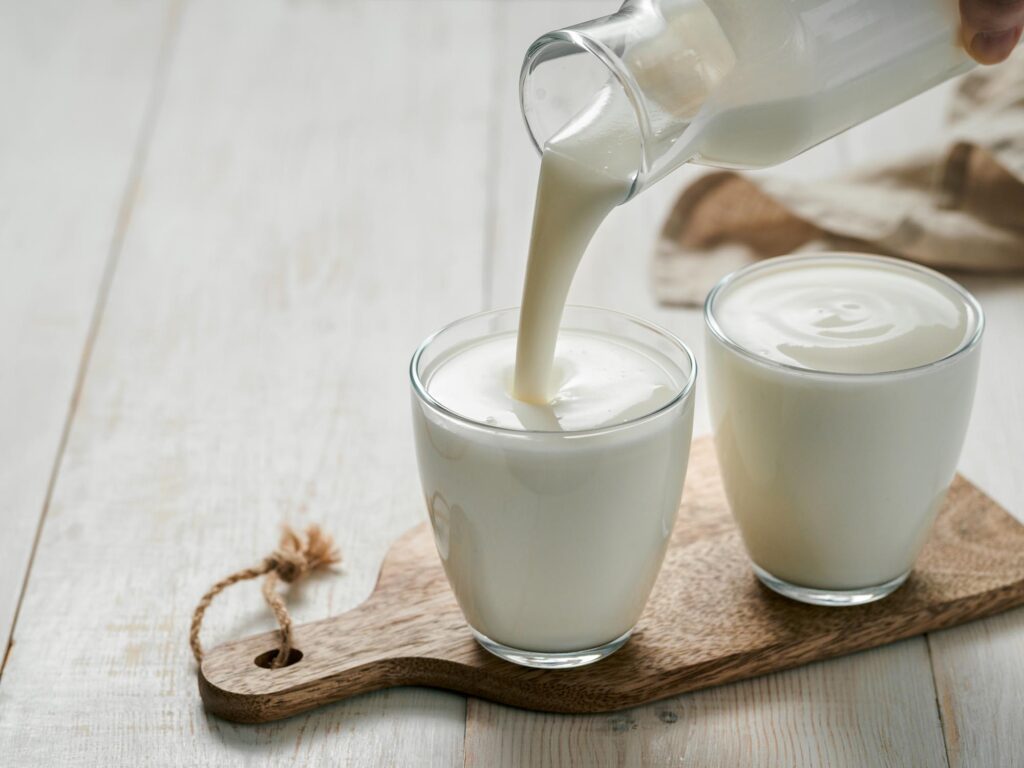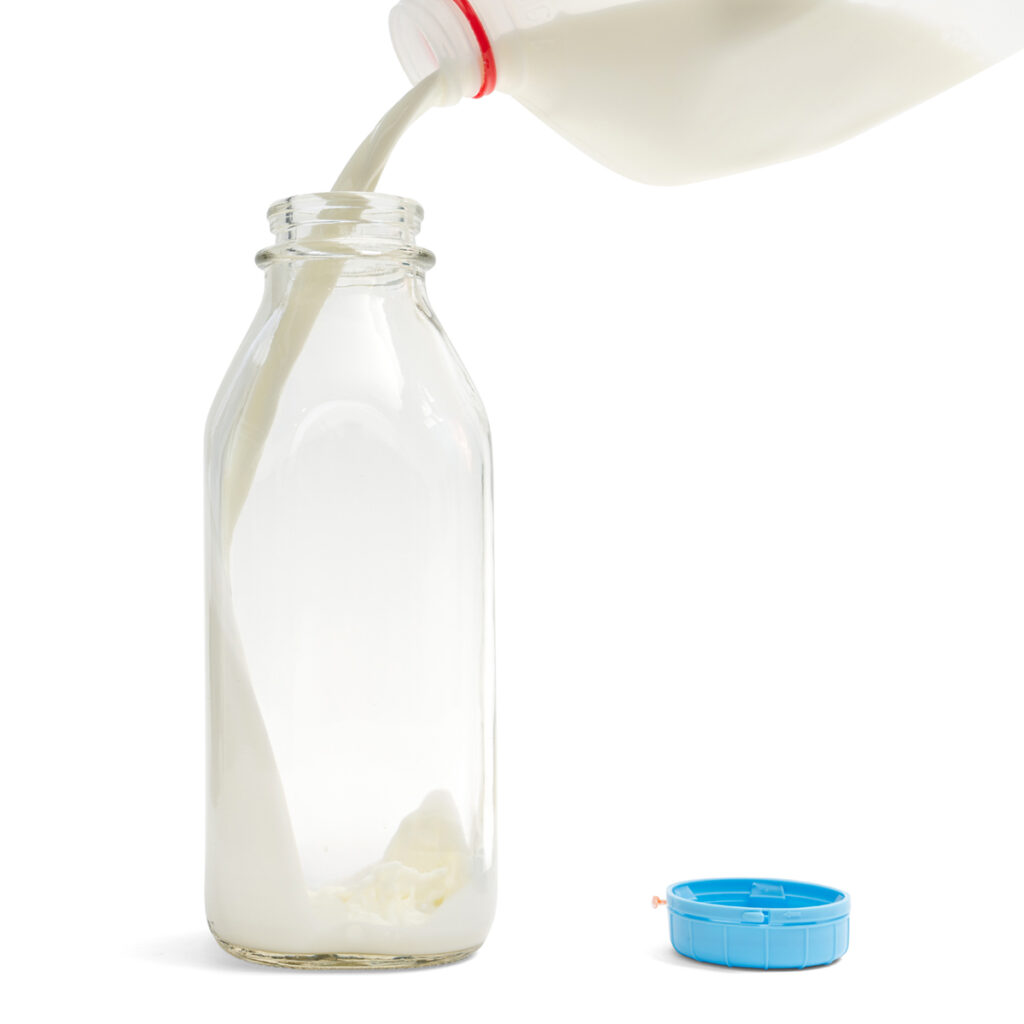Introduction
Craving a tasty yet super healthy drink? Try kefir!
In this article, we’ll talk about what kefir is, where it comes from, its potential benefits, and how you can create this amazing drink on your own. We’ll also give you a fantastic recommendation for the best kefir-based product in the market. Read on!

What is Kefir?
Kefir (pronounced kee-feer) is a fermented dairy drink with a tangy flavor. Its consistency is similar to yogurt, and it tastes carbonated because of the fermentation process.
Speaking of process, kefir-makers make this drink by adding bacteria and yeast cultures to milk. The milk, in turn, may come from cow, goat, or sheep. It originates from the Caucasus Mountains in eastern Europe around Turkey.
Fun fact: “kefir” comes from the word kiyef, which means “good feeling.”
Kefir comes in many types. As mentioned, you can create kefir using milk from cows, goats, and sheep — but you can also make this awesome beverage using juice and water.
You might think kefir can’t be lactose-free, but it nearly is. The fermentation process reduces the amount of lactose the milk contains. Note that this doesn’t entirely remove lactose from the drink.
Why is kefir a popular drink among health-conscious people? Let’s dive deeper into the reasons.
Why Kefir is Awesome: Benefits & Side Effects
Kefir is a great source of:
- Vitamin C
- Vitamin K
- Calcium
- Phosphorous
- Folate
- Magnesium
In other words: kefir is a nutritional powerhouse. It contains essential vitamins, probiotics, and protein. Adding kefir to your diet can be truly beneficial. For example, it can improve your digestive health because of its probiotics.
Here are more of kefir’s benefits:
Eliminates Constipation Problems
Constipation is frustrating. Luckily, the probiotics and yeast found in Kefir improve the health of your gut. This gets rid of constipation problems while improving your overall digestive health.
More on that, kefir contains an essential amino acid called Tryptophan. According to scientists, this amino acid relaxes the nervous system. This in turn helps your body process food and move it through your digestive tract.
Lowers Cholesterol
Studies show that kefir helps lower the body’s cholesterol levels. One study1 showed that women with obesity benefitted from drinking kefir regularly. The participants drank either:
- Two servings of low-fat milk per day
- Four servings of low-fat milk per day
- Four servings of kefir per day
The results? Those who drank kefir achieved lower cholesterol levels than those who drank only two servings per day of low-fat milk. The effect is similar to those who drank four servings of low-fat milk per day.
Gets Rid of Pathogens
Pathogens are microorganisms that harm your body and cause infections.
Here’s the good news: bacteria from kefir kill harmful microorganisms such as E. coli, Salmonella, and Staphylococcus aureus.2
What does this mean for you? Kefir may help prevent harmful infections such as gastroenteritis.
Note: more research is required to conclusively verify this effect. So you shouldn’t use probiotics from kefir as a replacement for medical treatment.
Improves Bone Health
Kefir is a great source of calcium and vitamin K2. The latter significantly helps with calcium metabolism, which in turn improves bone health and reduces the risks of fractures.3
This also helps you avoid osteoporosis, a condition where your bone tissues deteriorate. This condition increases the risk of fractures and is common among older women. It’s also a major health concern in many Western countries.
With an adequate intake of calcium and vitamin K2 sources — such as kefir — you might improve your bone cells’ calcium absorption. This increases your bone density and leads to stronger bones.
Protects Against Cancer
Everybody fears the big C – cancer is one of the worst causes of death around the world. It happens when mutant cells and tumors grow out of control.
How does kefir help prevent cancer? The probiotics in it stimulate your immune system, thereby improving your defenses against tumor growth. As a result, kefir shows a potential for protecting against cancer4.
Test tube studies have demonstrated this. One study showed that kefir may help reduce the number of human breast cancer cells by a whopping 56%5. For comparison, yogurt extract can only get rid of 14%.
May Suppress Symptoms Related to Asthma & Allergies
Allergic reactions and asthma happen because of inflammatory responses against certain food and substances.
Animal studies have shown that kefir can suppress inflammatory reactions such as allergies and asthma6. However, further research into human effects are necessary.
Side Effects
If you’re considering taking kefir, here’s the good news: there’s limited evidence on its potential risks. It’s generally safe to consume as long as you prepare and store it properly.
Lactose-intolerant people can drink kefir without worries. However, avoid drinking too much. Meanwhile, people with milk allergies should avoid kefir entirely unless it contains non dairy milk.
The same goes for those suffering from diabetes: stick to varieties that don’t have added sugar.
Can You Make Kefir At Home?
The quick answer is yes: you can make kefir at home. Do it in a clean environment and equipment so you can avoid contamination.
You’ll need:
- Active kefir grains
- Milk, which can be cow’s, goat’s, or coconut milk
- Paper coffee filter or cheesecloth
- Rubber band
- Silicone spatula/wooden spoon
- Nonmetal mesh strainer
Before starting the kefir creation, make sure your hands, jar, and other tools are dry and clean. Once that’s ensured, follow these steps:
- Add milk to a glass jar. Combine one teaspoon of kefir grains for every 1 cup of milk.
- Leave space at the top of the jar since the mixture will expand as it ferments.
- Cover the jar with a paper coffee filter. Use a rubber band to secure it.
- Store the jar in a warm place at around 70 degrees Fahrenheit (21 degrees Celsius) for 12 to 48 hours.
- Keep the jar away from direct sunlight and shake gently if you see the mixture separating.
- The mixture will thicken. Once that happens, pour the mixture through a mesh strainer into a sterile container.
- Cover the container tightly and store for up to one week in the refrigerator.
Pro tip: shorter fermentation leads to sweeter kefir, while longer fermentation produces a sourer drink.
You can use the kefir mixture like milk or yogurt. You can enjoy it:
- As a chilled drink in a glass.
- Poured on cereal or oats.
- As an addition to smoothies.
- By eating it with fruits.
Other people also use kefir in salad dressings, baked goods, and soups. Note that heating kefir will deactivate the live cultures in the mixture.
If DIY-ing your own kefir sounds like a lot of work you… try Sokii.
Sokii: Even Better Than Kefir
Sokii offers all of the benefits of kefir — and more. It’s a tart and tangy kefir smoothie that offers ultra-organic goodness to your body.

Sokii has More Probiotics
Sokii contains a proprietary blend of 11 gut-specific probiotic strains. All you have to do is culture it at body temperature, and you can enjoy trillions of live healthy cultures. This blend also works well with skim milk, giving you amazing fat-free shakes.
Sokii Tastes Better
Unlike other homemade kefir drinks, which can be too sour or tasteless without proper preparation, Sokii tastes great. You can mix it with almond and coconut milk to enjoy a better taste. Adding sugar is also recommended to feed kefir, but it shouldn’t contain any preservatives or other additives.
People love Sokii
Sokii has five-star reviews from customers who’ve enjoyed its benefits and taste. Sokii’s premium DIY kefir kit offers everything you need to culture yourself a wonderful, creamy, and great-tasting drink. You don’t need to be an expert to source kefir grains from other vendors — just get the kit and start creating the amazing drink you deserve.
Try Sokii Today
If you’re not sure where to start, try Sokii’s Probiotic Starter Kit (6 packs) at just $26.97. You can purchase one time, but we recommend subscribing to enjoy a 5% discount on your kits. Be bold, and be cultured with Sokii today at Theranaturals.com!
Scientific Sources
1. https://www.lipidjournal.com/article/S1933-2874(16)30414-7/fulltext
2. https://www.ncbi.nlm.nih.gov/pmc/articles/PMC3833126/
3. https://www.ncbi.nlm.nih.gov/pmc/articles/PMC6955144/
4. https://pubmed.ncbi.nlm.nih.gov/27144297/
